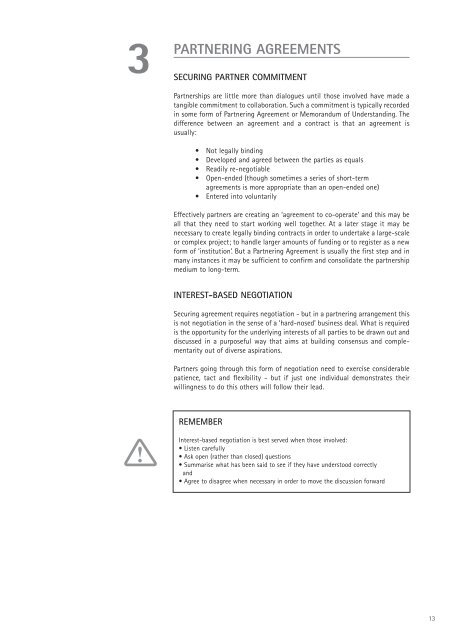Partnering
The Partnering Toolbook - Energize, Inc.
The Partnering Toolbook - Energize, Inc.
- No tags were found...
Create successful ePaper yourself
Turn your PDF publications into a flip-book with our unique Google optimized e-Paper software.
3<br />
PARTNERING AGREEMENTS<br />
SECURING PARTNER COMMITMENT<br />
Partnerships are little more than dialogues until those involved have made a<br />
tangible commitment to collaboration. Such a commitment is typically recorded<br />
in some form of <strong>Partnering</strong> Agreement or Memorandum of Understanding. The<br />
difference between an agreement and a contract is that an agreement is<br />
usually:<br />
• Not legally binding<br />
• Developed and agreed between the parties as equals<br />
• Readily re-negotiable<br />
• Open-ended (though sometimes a series of short-term<br />
agreements is more appropriate than an open-ended one)<br />
• Entered into voluntarily<br />
Effectively partners are creating an ‘agreement to co-operate’ and this may be<br />
all that they need to start working well together. At a later stage it may be<br />
necessary to create legally binding contracts in order to undertake a large-scale<br />
or complex project; to handle larger amounts of funding or to register as a new<br />
form of ‘institution’. But a <strong>Partnering</strong> Agreement is usually the first step and in<br />
many instances it may be sufficient to confirm and consolidate the partnership<br />
medium to long-term.<br />
INTEREST-BASED NEGOTIATION<br />
Securing agreement requires negotiation - but in a partnering arrangement this<br />
is not negotiation in the sense of a ‘hard-nosed’ business deal. What is required<br />
is the opportunity for the underlying interests of all parties to be drawn out and<br />
discussed in a purposeful way that aims at building consensus and complementarity<br />
out of diverse aspirations.<br />
Partners going through this form of negotiation need to exercise considerable<br />
patience, tact and flexibility - but if just one individual demonstrates their<br />
willingness to do this others will follow their lead.<br />
REMEMBER<br />
Interest-based negotiation is best served when those involved:<br />
• Listen carefully<br />
• Ask open (rather than closed) questions<br />
• Summarise what has been said to see if they have understood correctly<br />
and<br />
• Agree to disagree when necessary in order to move the discussion forward<br />
13


